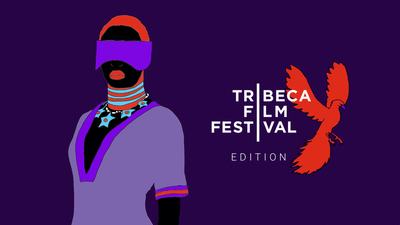
BY ZACHARY WIGON |
Ricky Van Veen and the Future of Niche Content (Part 1)
Many people talk about trying to find a new paradigm for digital distribution. Ricky Van Veen is doing it. Part one of our two-part interview with the CollegeHumor co-creator about what he learned distributing 'Coffee Town.'

(Editor's note: we couldn't stand to cut a word of this interview, so come back tomorrow for part two.)
It's generally acknowledged that VOD and digital distribution platforms will hold the key to greater film industry revenue in the future, the likely replacement for the once-lucrative DVD sales that ensured so many films, be they indies or blockbusters, could easily recoup costs. However, for the most part VOD has remained a backup strategy, a plan that filmmakers view as a falling-short of the desired goal of a giant theatrical release with a top distributor.
Ricky Van Veen, co-founder of CollegeHumor, has taken a different approach as of late. CollegeHumor has long been a pioneer in the realm of internet media - the website, which became famous for producing comedy videos it then featured, was created in 1999 and bought by Barry Diller's IAC in 2006 - and the site continues to innovate. They recently launched a primarily-digital distribution of their first feature film, Coffee Town, a Brad Copeland written-and-directed comedy which features Glenn Howerton (It's Always Sunny In Philadelphia) as a thirtysomething slacker who decides to rob the coffee shop he uses as his office.
With a wry Office Space-esque tone - one that equally reflects the comedy found on CollegeHumor itself - the film seems like a perfect fit for the site's viewership as well as the broader audience of Apatow & Co. comedy fans, who represent such a significant share of the comedy-viewing market today. By eschewing traditional distribution methods almost entirely, CollegeHumor's digital distribution structure for Coffee Town is a fascinating example of how more films may find audiences in the future, and Van Veen's thoughts on the film industry milieu, coming from a techie outsider, reflect an objective clarity on the tangled realities of contemporary film distribution.
I sat down with Van Veen recently to discuss all this, and more.
Tribeca: Tell me a little bit about the distribution strategy for Coffee Town.
Ricky Van Veen: There were a couple components to it. One was a theatrical tour, which was mostly for buzz creation, rather than trying to make money. The bulk of the distribution was digital. We distributed it anywhere where there's a regular flow of people checking out movies - iTunes, Amazon, XBox, Vudu, VOD for every cable provider. Our strategy was to try to double down on iTunes. We wanted to do that because it's easy to link someone to iTunes - you can't link someone to their Time Warner cable box - and since most of our advertising was digital, we wanted to remove as many steps as possible. If someone sees an ad that says 'Coffee Town is available on VOD, watch it this weekend', they have to remember to check that out, find it on the menu. With iTunes or Amazon we can just say, click here and rent it right now. That was one reason we wanted to do iTunes.
Additionally, we wanted the network effect of getting in the iTunes top 10, which we did. Personally, when it's a Friday night and I want to watch a movie, I'll browse through what's in the top. Because our marketing budget for this was tiny, we wanted to use that in the right place and then let other things take effect - so we had paid media in the beginning, and then earned media was what we coasted on. We had people discover it, and it goes between four and four and a half stars on iTunes.
We took what we'd learned from our time advertising in the online world and took it to movie marketing, which we quickly learned had not been done before.
In terms of marketing, we had this huge platform, CollegeHumor, which has 15 million unique visitors monthly, and also Dorkly, which is our video game/nerd site. So we advertised on our owned and operated properties, but we also have a YouTube channel with five million subscribers. So we could show the trailer there, deleted scenes, that kind of thing. We put the trailer up and instantly it had 500,000 views. For a movie with no pre-awareness, that was pretty impressive. Had we started a new channel and put the trailer up, it might have gotten 10,000 views. So that was a great promotional tool and it didn't cost us a thing. We did some Tumblr advertising and we did some tests on Twitter, but between the CollegeHumor owned and operated properties, which have a lot of comedy fans, and Facebook, that comprised the bulk of our advertising.
With Facebook, we had a movie didn't have massive stars, but we had people with smaller but potent followings. Like Always Sunny has a strong following, so does Parks and Rec, Friday Night Lights. Josh Groban was like a secret weapon - he has a massive fan base that wants to see him in just about anything.
I don't know anybody who says, let's go check that movie out, it's a Sony movie!
We took what we'd learned from our time advertising in the online world and took it to movie marketing, which we quickly learned had not been done before. We would ask around and say to Facebook, okay, when people push to iTunes, what kind of data do they get? And Facebook said, well, we've seen people market movies before, but no one has been this granular. So we looked at the acquisition funnel, and like any online business, we figured out that it took this much to get a click, and that percentage of people will watch the trailer, and that percentage of people go to iTunes, and that percentage of people will actually buy it.
Of course, you can only go down so far because iTunes will not tell you if someone has purchased the film or not based on one click, so you have to make approximations based on when you put ads out there and the amount of money you made that day.
Tribeca: Isn't it in iTunes's best interest to share that information?
Ricky Van Veen: I think it is. Right now they think it's proprietary. Maybe as these other platforms, like VHX or what Vimeo is doing, if they offer the data they may force iTunes's hand so that iTunes has to release more data to remain competitive. In the future, I can see many movies with strong online fan bases being distributed like this, and I think iTunes is going to want to be the platform on which it's done.
Tribeca: So it seems like your marketing is sort of based upon the idea that the CollegeHumor brand is the filter, Coffee Town is the film, and your audience is trusting your brand and buying the film on that basis. It's quite different from the way a studio would operate.
Ricky Van Veen: Exactly - I don't know anybody who says, let's go check that movie out, it's a Sony movie! The most narrow you get with that is, oh, it's a Blumhouse movie, you know the production company.
I've been looking at the National Lampoon model ever since we started CollegeHumor, reading books about how basically, they were a filter. They had a magazine and that had a tone, and they had TV shows and then Animal House, their breakout movie. After that, people knew that if they saw a National Lampoon movie, it would be in the same tone - bawdy, irreverent, male-POV kind of stuff. Eventually they took it too far - I heard a few years ago that it got to the point where you could license their name for $100K - so at that point they clearly lost their credibility as a filter. But if CollegeHumor can become a filter, that would be fantastic.
The next phase after the electronic sell-through is the subscription VOD/TV - like Netflix. That's where I'm really excited for the film, because when I look at movies of its type, like Office Space - you know, Office Space wasn't a hit immediately, but by being available to the right demographic in the right way, like rerunning on Comedy Central all day, it was able to build up this cult following. I feel like Coffee Town ideally takes that same route as it gets exposed to more people - it's not a movie that everybody saw right away, but I think it has a lot of legs.
Tribeca: Do you see it as being a situation where there's a way to greatly expand the CollegeHumor audience, or do you see the new media landscape as being more of a niche situation where everyone stakes out their corner of the internet and caters to their base?
Ricky Van Veen: I think the best example is Louis CK. He was the first person who came along and said, I have these fans, the fan group is big enough that I can reach them directly and charge them directly. Aziz Ansari did that, and that worked, but for his second special he decided to go on Netflix and have a free thing. Because he said, you're basically preaching to the choir when you're reaching just your core audience. But at the same time you want to be able to monetize that core audience. So I think it's a mix. I could see Louis CK doing an HBO special, and then a paid download, and maybe a combination of the two, where it's windowed as a paid download and then it's on TV, so he can get new fans who aren't willing to pay for his stuff yet. So I think - it's such a good question - I think it's a combination of both. You always have to be growing your fan base and your brand, regardless of how you're distributing. The core fan base kind of takes on the role of the evangelist - I mean, Coffee Town isn't limited to CollegeHumor fans alone, it's a broad comedy - so the idea is that the core fans are the evangelists and then that expands outwards.
(Part 2 of this interview.)

